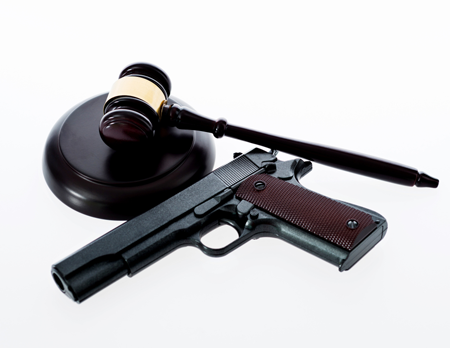ABA House opposes arming teachers and supports suicide-prevention measure

Image from Shutterstock.
The ABA's policymaking body voted to take positions on the hotly debated topic of firearms Monday, approving measures that oppose firearms training for teachers and favor giving people who believe they’re at risk of suicide the ability to opt out of firearms ownership.
Resolution 106A opposes laws that would authorize teachers and other nonsecurity school employees to carry guns at pre-K through grade 12 schools. It also opposes the use of public funds to arm and train those people.
The resolution thus allows the ABA to weigh in on a public debate that sprang up after the shooting at Marjory Stoneman Douglas High School on Valentine’s Day of last year. President Donald Trump suggested that arming teachers was a solution, an idea also suggested by the National Rifle Association.
Monte Frank, a delegate from the Connecticut Bar Association and an advisory member of the ABA’s Standing Committee on Gun Violence, moved the resolution in the ABA House of Delegates. But Frank spoke at least as much as a resident of Newtown, Connecticut, and a lawyer for that town. Noting that his daughter went to Sandy Hook Elementary School—which was the scene of a massacre in December 2012—he recounted his conversations with second-grade teacher Abbey Clements, who was teaching on the day of the shooting.
“She said ‘I’d like to make something perfectly clear,’” Frank recounted. “‘If teachers had been armed, it would not have helped, In fact, it may very well have made things even worse.’”
Frank concluded by urging the House to join the educator organizations opposed to arming teachers by passing the resolution. It did, although there were audible nays.
Frank was immediately back, however, to move Resolution 106B, which addresses a different gun topic: suicide. Resolution 106B aims to reduce suicides by letting people voluntarily opt in to a list of people to whom guns should not be sold. This “do not sell” list would be added to existing databases of people who are not eligible to buy firearms. People who voluntarily add themselves to the list would be able to confidentially and voluntarily take themselves off—but there would be a waiting period.
Frank said laws like this—the state of Washington has one and at least five other jurisdictions have considered it—would save lives by preventing impulsive suicides by gun. Suicide attempts using firearms are much more likely to succeed, so permitting people who feel they may harm themselves (or others) to voluntarily opt out of gun ownership could increase the chance to reconsider. The voluntary nature of the list would prevent Constitutional issues.
“The election is voluntary, confidential and revocable,” he said. “There are no Second Amendment concerns.”
No one spoke in opposition, but Robert Gonzales, chair of the ABA Commission on Disability Rights, spoke briefly to thank Resolution 106B’s sponsors for withdrawing a prior version of the resolution in order to work with the commission on its concerns. This time around, Gonzales pointed out, the commission is a co-sponsor.
The measure passed with no audible opposition.
The Standing Committee had originally sponsored a third measure on guns in courthouses, Resolution 106C, but withdrew it before the meeting.
Follow along with ABA Media Relations’ full coverage of the 2019 ABA Midyear Meeting and the ABA Journal’s news stories.



